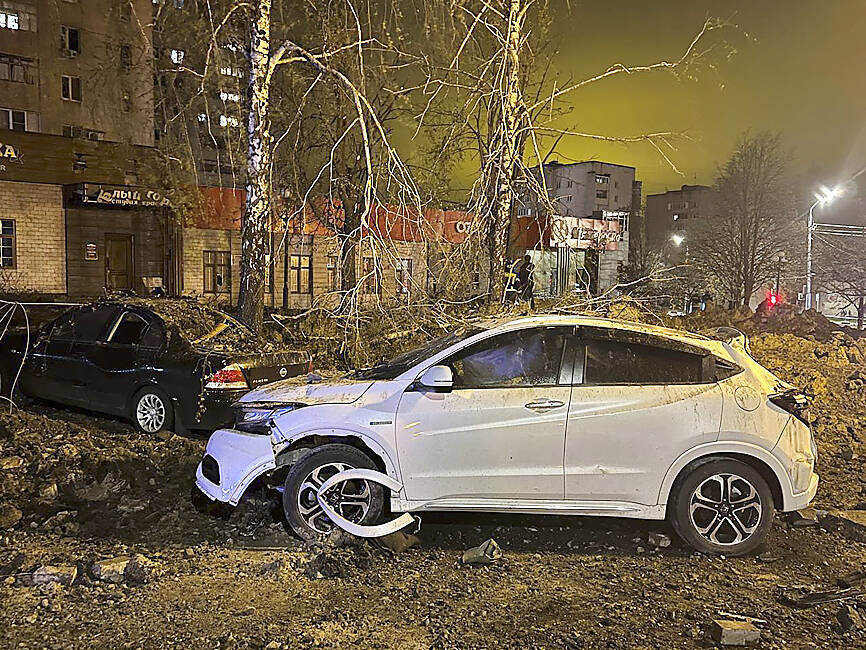Seventeen apartment buildings were evacuated on Saturday in a Russian city near the Ukrainian border after an explosive device was found at the site where a bomb accidentally dropped by a Russian warplane caused a powerful blast this week, authorities said.
The bomb blast late on Thursday rocked part of Belgorod, leaving a large crater and three people injured. The Russian Ministry of Defense quickly acknowledged that a weapon accidentally released by one of its own Su-34 bombers caused the explosion.
The ministry said an investigation was under way, but did not elaborate on the details of the weapon, which military experts said was likely a powerful 500kg bomb.

Photo: EPA-EFE / handout / Belgorod Governor Vyacheslav Gladcov Telegram channel
Belgorod Oblast Governor Vyacheslav Gladkov on Saturday said that sappers examining the site of Thursday’s blast found and decided to detonate what he called an “explosive object” that was “in the immediate vicinity of residential buildings.”
The precautionary evacuations ended later in the day, Belgorod Mayor Valentin Demidov said.
“The bomb was removed from the residential area. Residents are being delivered back to their homes,” Demidov wrote on Telegram.
Russian authorities did not say if the detonated device was dropped by accident on Thursday and if so, if it was a remnant of or separate from the bomb that exploded in the city.
Belgorod, about 40km east of the Russia-Ukraine border, has faced regular drone attacks since Russia sent troops into Ukraine in February last year. Russian authorities have blamed those strikes on the Ukrainian military, which refrained from directly claiming responsibility for the attacks.
Late on Saturday, Kharkiv Oblast Governor Oleh Syniehubov said that five missiles fired from the Belgorod area hit the Ukrainian region, including one that struck unspecified “civilian infrastructure” in the capital, Kharkiv.
Moscow’s invasion of Ukraine has sent relations with the West into deep freeze, with frequent expulsions of diplomats on both sides.
Also on Saturday, the Russian Ministry of Foreign Affairs said that German authorities had “decided on another mass expulsion of employees of Russian diplomatic missions in Germany.”
A ministry statement said that “as a reaction to the hostile actions of Berlin,” Russia decided to “mirror” the expulsions by Germany and “significantly limit” the maximum number of staff at German diplomatic missions in Russia.
Ministry spokeswoman Maria Zakharova said that Russia is expelling more than 20 German diplomats, Russian state media reported, but did not give a precise number.
The German Federal Foreign Office said it took note of the comments.
The German government and Russia had been in contact in the past few weeks on “questions regarding the staffing of the respective diplomatic missions” and that a flight on Saturday took place in that context, it said, without elaborating.
The German air force said earlier that a Russian plane flew to Berlin with diplomatic clearance on Saturday, but did not specify who or what was on board.

When Shanghai-based designer Guo Qingshan posted a vacation photo on Valentine’s Day and captioned it “Puppy Mountain,” it became a sensation in China and even created a tourist destination. Guo had gone on a hike while visiting his hometown of Yichang in central China’s Hubei Province late last month. When reviewing the photographs, he saw something he had not noticed before: A mountain shaped like a dog’s head rested on the ground next to the Yangtze River, its snout perched at the water’s edge. “It was so magical and cute. I was so excited and happy when I discovered it,” Guo said.

TURNAROUND: The Liberal Party had trailed the Conservatives by a wide margin, but that was before Trump threatened to make Canada the US’ 51st state Canada’s ruling Liberals, who a few weeks ago looked certain to lose an election this year, are mounting a major comeback amid the threat of US tariffs and are tied with their rival Conservatives, according to three new polls. An Ipsos survey released late on Tuesday showed that the left-leaning Liberals have 38 percent public support and the official opposition center-right Conservatives have 36 percent. The Liberals have overturned a 26-point deficit in six weeks, and run advertisements comparing the Conservative leader to Trump. The Conservative strategy had long been to attack unpopular Canadian Prime Minister Justin Trudeau, but last month he

Chinese authorities said they began live-fire exercises in the Gulf of Tonkin on Monday, only days after Vietnam announced a new line marking what it considers its territory in the body of water between the nations. The Chinese Maritime Safety Administration said the exercises would be focused on the Beibu Gulf area, closer to the Chinese side of the Gulf of Tonkin, and would run until tomorrow evening. It gave no further details, but the drills follow an announcement last week by Vietnam establishing a baseline used to calculate the width of its territorial waters in the Gulf of Tonkin. State-run Vietnam News

PROBE: Last week, Romanian prosecutors launched a criminal investigation against presidential candidate Calin Georgescu accusing him of supporting fascist groups Tens of thousands of protesters gathered in Romania’s capital on Saturday in the latest anti-government demonstration by far-right groups after a top court canceled a presidential election in the EU country last year. Protesters converged in front of the government building in Bucharest, waving Romania’s tricolor flags and chanting slogans such as “down with the government” and “thieves.” Many expressed support for Calin Georgescu, who emerged as the frontrunner in December’s canceled election, and demanded they be resumed from the second round. George Simion, the leader of the far-right Alliance for the Unity of Romanians (AUR), which organized the protest,